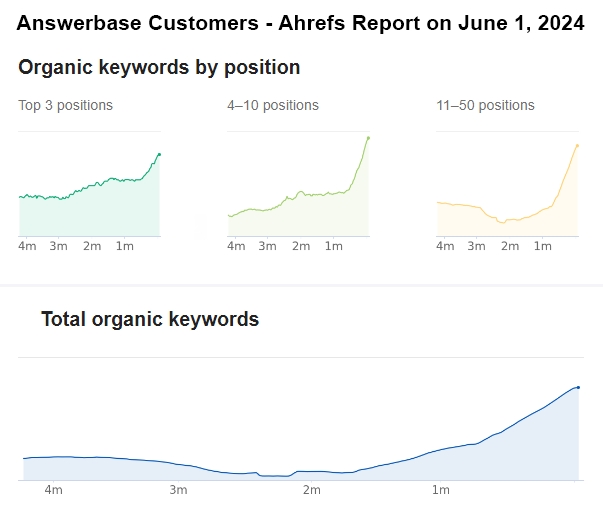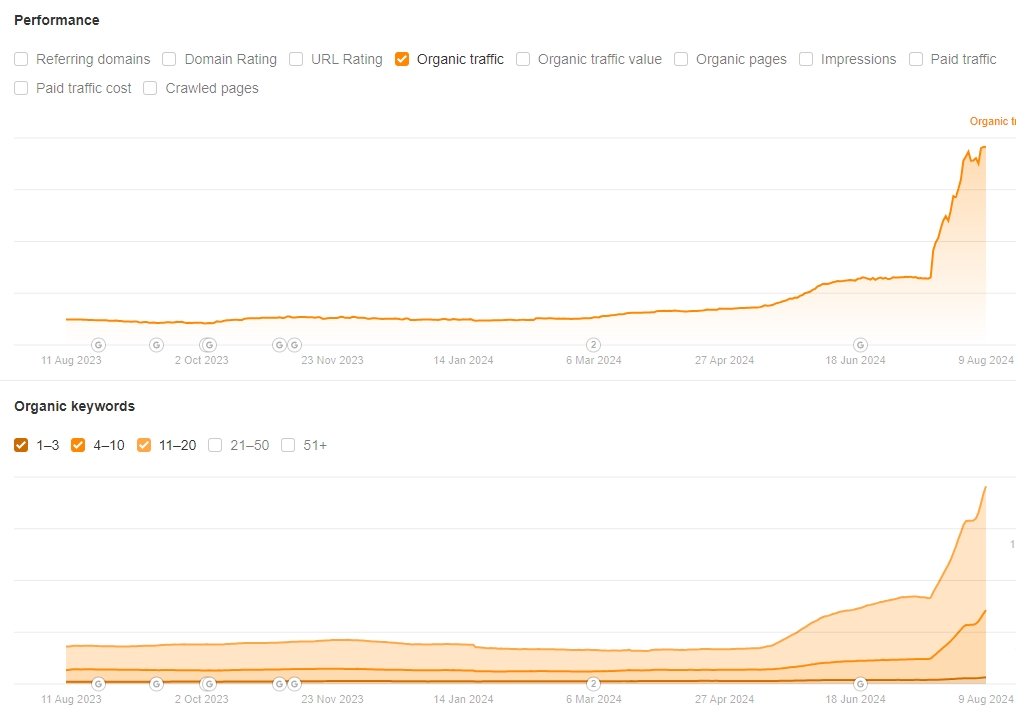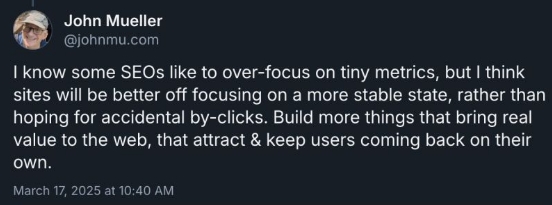Answer
Aug 21, 2024 - 02:10 PM
There are some common things that we run into that businesses are nervous about which we categorize as "SEO Myths", and Google addresses each of them in their documentation and "SEO Mythbusting" content. These items should be understood so that businesses aren't held back from constraints that are not true and hold no weight in Google's eyes. Here are some common ones we run into.
It's important to know what is true vs what is an "SEO Myth" so you can make sure that you're generating and publishing all of the content that is (1) helpful for the visitors on your site and (2) Google can index and drive traffic to your site. Simply service your customers with great information when/as they request it or share insights that occur to you (and is useful to your customer) as you become more knowledgeable about the product and service. Satisfying your customer requests has conversion and customer retention value, and sharing new insights is highly sharable.
We'll also look to note any other things that Google has specifically communicated which may surprise you so you don't lose your focus and distract your SEO budget and resources towards things that are less important than creating "people first" helpful content. We'll note any items we run into over time here:
What does Google think about Q&A content generated through Answerbase?
Answerbase has always been focused on making sure that the customer's request for information can be satisfied by the best possible resource within a company and then published and distributed in the most efficient way to provide measurable value to future visitors who are finding the content both on your site and through search engines. As Google's continued to press towards rewarding "people first content" we've seen our methods drive notably more traffic to that content and lift to the product and services pages that content is helping to drive traffic to. For example, see what happened to the positions of Answerbase customers through Google's March 2024 updates to their core ranking systems as they integrated the Helpful Content System into many of their core ranking systems and signals.

We've seen even more dramatic gains through the August 2024 core ranking updates as Google continues to reward "people-first content"....see what happened to that same broad range of customers and their Q&A content as that rolled out (and it's continued):

We would love to talk through what Google's been up to and why, and are happy to schedule a call to educate you on what is going on and walk thorugh what Google has said and done on a number of these things. We've also collaborated with our agency partners on a White Paper called "Why The Present & Future of SEO is People-First Helpful Content” which does a deep dive on a lot of these things and would be a helpful resource if you're looking to get an overview.
We're happy to help and make sure you're equipped to survive and thrive in the future as everything steers towards genuine "people first content" that demonstrates E-E-A-T (Experience, Expertise, Authoritativeness, and Trustworthiness), reach out if there is anything else we can do for you.
- Crawl Budget: Most sites have under 1 million pages, and Google has clearly communicated that you would need millions of pages for crawl budget to even be a consideration. But, you run into customers with tens of thousands of pages that get nervous about their crawl budget...even though it doesn't exist for them. We encourage you to watch the video of Google addresses this at the following link to clarify any misunderstandings here. Interestingly, it's part of their video series called "SEO Mythbusting":
- Thin Content: We hear many talk about concern with "thin content" when Google has clearly communicated they don't track word count (or link count which is helpful to know as well), Search Engine Roundtable covered what Google had to say about this in this article. The only thing that businesses should be concerned about is whether the content is helpful or not...if it is, it has a place to service your customers both on your website and through search engines.
- Duplicate Content Penalty (there's no such thing): This is another one that you run into from time to time, and it simply doesn't exist. We wrote a whole post about this and where Google communicates about this fact, you can read that here. In short....unless you're ripping off content form another site and passing it off on your own in a malicious way, you're fine if some content is repeated on your own site. If it's useful for the visitor to the page, since Google's core ranking systems are primarily designed to focus on the page level....you should service each visitor to each page with whatever information that is going to satisfy their search intent and experience.
- Google Indexing Content Rendered by JavaScript: This is something that you'll hear but is not true, Google can read and index content rendered by JavaScript within your pages just fine. We encourage you to read our post which covers this, but in short....Google renders each page their crawl via the Chrome browser and that renders the page as the user sees it..and indexes all the content that the visitor sees. Google actually has a pretty easy tool within Google Search Console (we show you how to access that in the link provided earlier) so you can see the crawled page and inspect it to see the JavaScript loaded content right there in HTML (as content, links, etc.)...which is what the recognize and index as being part of your page.
- Length of Content: We've heard this many times where people feel that Google has some kind of threshold of content length which makes them respect some pages more than others based on how much content is on it. They don't. In fact, they've made it very clear that sometimes shorter content (even 1-2 sentences) can be the highest quality content for some searches. We covered this in an article that you can read here which covers exactly what Google has said on this topic.
- Use of AI in Creating Content: We've talked to some customer who are terrified of using AI at all, but they don't know that it's not against Google's Guidelines and Google has specifically communicated that. We wrote a whole post about this that you can read here to hear exactly what they had to say.
- Text to Code Ratio: This is one you've heard in the past and may still hear from time to time. Fact is, Google doesn't take this into account at all. You can see what Google says about this in a video by following this link.
- Toxic Links: Google has clearly communicated that "toxic links" aren't a thing when it comes to SEO, their exact language is "The concept of toxic links is made up by SEO tools so that you pay them regularly." which you can read here. Obviously, don't participate in shady link building practices on your own but also don't be sold on practices that have no impact on your SEO.
- "Adding E-E-A-T": We've run across many "SEO experts" and Agencies that have mentioned that as part of their services....they ensure that each page has E-E-A-T (Experience, Expertise, Authoritativeness, and Trustworthiness) added on the page through more information about the author, links to their LinkedIn profiles, etc. Well, let's see what Google said about that interpretation of E-E-A-T...."Sometimes SEOs come to us or like mention that they’ve added E-E-A-T to their web pages. That’s not how it works.". You can read the full post about what Google said about this which includes that quote.....but if you have an SEO service selling you the fact that they are going to "Add E-E-A-T" to your pages and website...they don't understand what E-E-A-T is and how Google determines/uses it.
- Structured Data Impacting Rankings and "Importance" of FAQ Schema: There is a common misperception that you having structured data on your page helps you with how Google looks at your site from a rankings standpoint, it does not. As reported by Barry Schwartz.....Google's John Mueller said this very clearly "Structured data won't make your site rank better.". Google's stopped taking into account FAQ schema for site other than health and goverment sites where they communicated in their announcement years ago "FAQ (from FAQPage structured data) rich results will only be shown for well-known, authoritative government and health websites"".... and it doesn't impact how Google looks at you for ranking....so consider what you're being sold as "SEO Services" and where you're spending your spend time and your monetary resources focusing on this stuff and sacrificing any time you could spend in creating helpful content that your customers actually want to see.
It's important to know what is true vs what is an "SEO Myth" so you can make sure that you're generating and publishing all of the content that is (1) helpful for the visitors on your site and (2) Google can index and drive traffic to your site. Simply service your customers with great information when/as they request it or share insights that occur to you (and is useful to your customer) as you become more knowledgeable about the product and service. Satisfying your customer requests has conversion and customer retention value, and sharing new insights is highly sharable.
We'll also look to note any other things that Google has specifically communicated which may surprise you so you don't lose your focus and distract your SEO budget and resources towards things that are less important than creating "people first" helpful content. We'll note any items we run into over time here:
- Importance of Page Performance and Core Web Vitals: SEO influencers like Barry Schwartz and Glenn Gabe recently posted about Google's video about site speed and performance....where Barry communicated to the world about Google's new video that "Google's Martin Splitt in a new video says these Core Web Vitals aren't as important as some people might think they are and do not over focus on these things". What Martin says in the video is that "Google always seeks to show the most relevant content even if the page experience is not the best". He goes on to say that page loading and core web vitals aren't as important as people think they are" and to "not over focus on these things"....you can hear his exact quote here within the video (it's a short video overall, we encourage you to watch the whole thing). Google's John Mueller also made a comment on a LinkedIn post that was communicating that page performance was causing a major issue with rankings....where John communicates as a reply "We've been pretty clear that Core Web Vitals are not giant factors in ranking". Of course it's great to have a fast page that passes all these core web vitals and page speed with flying colors, but what trumps that is that you are providing people first content that actually satisfies the search intent....so focus your time and budget on that as a priority...and then if you have additional bandwidth/budget/resources you can dig into the other details. See Google's John Mueller comment here on the topic:

- Focusing on SEO Metrics vs Value to Web and Users: Along the lines of what is mentioned above related to Core Web Vitals and how SEOs are over-focused on that.....Google knows that SEOs are many times focused on everything and anything other than servicing actual people and having their content strategy, content ideas, and how they publish and distribute that content across a website....focused on creating content that is bringing new value to the planet and laser focused what the customer wants vs what they think (it's become apparent that the SEO common practices don't "know" anymore) is going to perform well for SEO. See what John Mueller said about this that SEO influencer Barry communicated in his post on Linkedin:

What does Google think about Q&A content generated through Answerbase?
Answerbase has always been focused on making sure that the customer's request for information can be satisfied by the best possible resource within a company and then published and distributed in the most efficient way to provide measurable value to future visitors who are finding the content both on your site and through search engines. As Google's continued to press towards rewarding "people first content" we've seen our methods drive notably more traffic to that content and lift to the product and services pages that content is helping to drive traffic to. For example, see what happened to the positions of Answerbase customers through Google's March 2024 updates to their core ranking systems as they integrated the Helpful Content System into many of their core ranking systems and signals.

We've seen even more dramatic gains through the August 2024 core ranking updates as Google continues to reward "people-first content"....see what happened to that same broad range of customers and their Q&A content as that rolled out (and it's continued):

We would love to talk through what Google's been up to and why, and are happy to schedule a call to educate you on what is going on and walk thorugh what Google has said and done on a number of these things. We've also collaborated with our agency partners on a White Paper called "Why The Present & Future of SEO is People-First Helpful Content” which does a deep dive on a lot of these things and would be a helpful resource if you're looking to get an overview.
We're happy to help and make sure you're equipped to survive and thrive in the future as everything steers towards genuine "people first content" that demonstrates E-E-A-T (Experience, Expertise, Authoritativeness, and Trustworthiness), reach out if there is anything else we can do for you.

